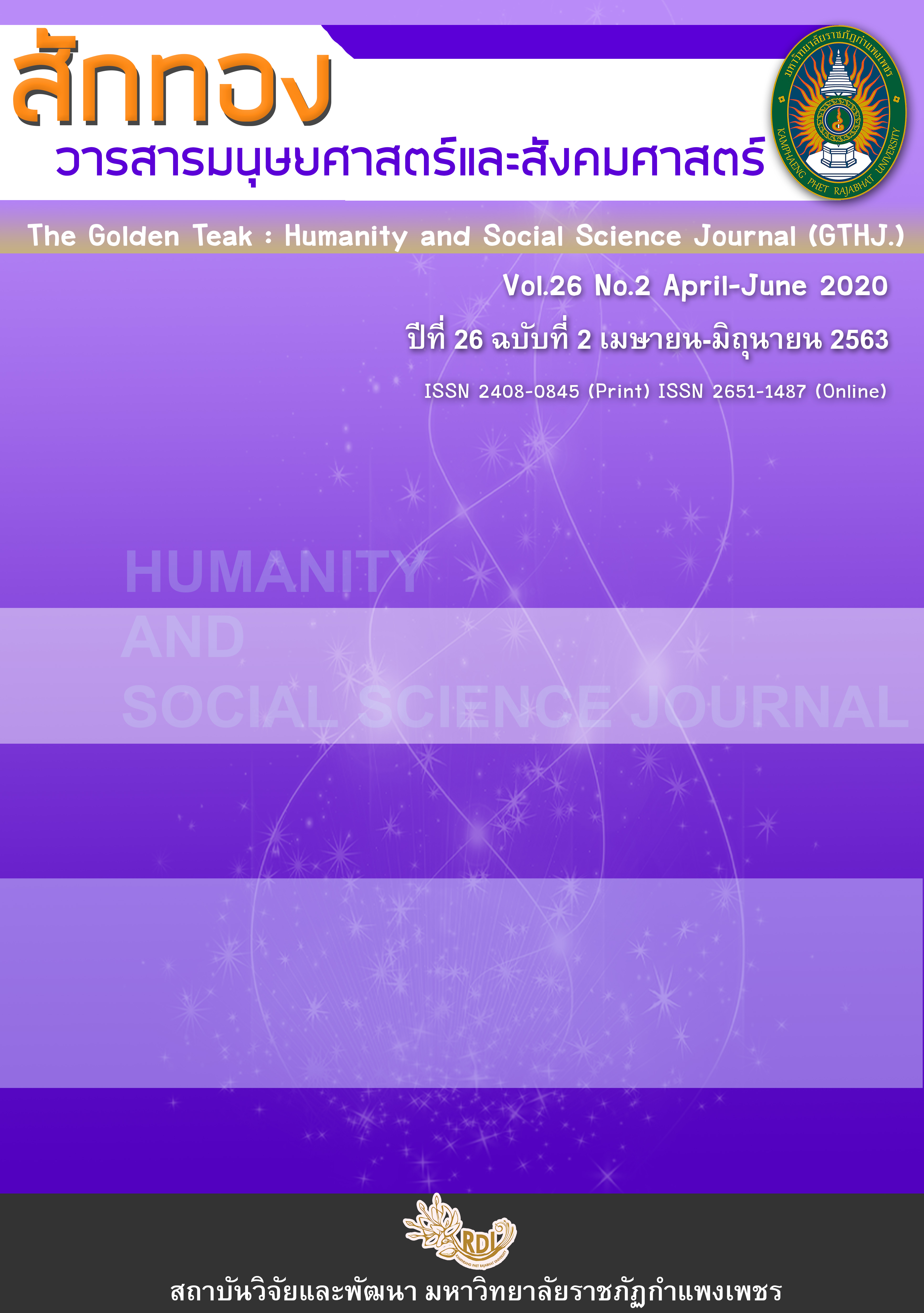Student Digital Citizenship Indicators in Higher Education Institutions
Main Article Content
Abstract
The purpose of this research is to study the student digital citizenship indicators in higher education institutions. The research methods are: 1. Study and synthesize the documents of digital citizenship indicators and behavioral indicators. 2. Investigate the appropriateness of digital citizenship indicators and behavioral indicators by experts 8 people who were selected by using purposive sampling. The research instrument was a questionnaire to evaluate the appropriateness of digital citizenship indicators and behavioral indicators. The data were analyzed by using frequency distributions, median, and interquartile range. The result revealed that; 1) There were 11 indicators and 24 behavioral indicators for student digital citizenship in higher education institutions as follows: digital access (2 behavioral indicators), digital commerce (3 behavioral indicators), digital communication (2 behavioral indicators), digital etiquette (3 behavioral indicators), digital literacy (3 behavioral indicators), digital law (2 behavioral indicators), digital rights and responsibilities (2 behavioral indicators), digital health and wellness (2 behavioral indicators), digital security (2 behavioral indicators), digital identity (2 indicator behavior), and digital safety (2 behavioral indicators). 2) The indicators and behavioral indicators for student digital citizenship in higher education institutions were found that appropriateness was between a high level to the highest level.
Article Details
บทความที่ได้รับการตีพิมพ์เป็นลิขสิทธิ์ของวารสาร สักทอง : วารสารมนุษยศาสตร์และสังคมศาสตร์ สถาบันวิจัยและพัฒนา มหาวิทยาลับราชภัฏกำแพงเพชร
ข้อคิดเห็นใดๆ ที่ปรากฎในวารสารเป็นวรรณกรรมของผู้เขียนโดยเฉพาะ ซึ่งมหาวิทยาลัยราชภัฏกำแพงเพชรและบรรณาธิการไม่จำเป็นต้องเห็นด้วย
References
Self-Disclosure Online. Computers in Human Behavior, 27(5), 1634-1642.
Armendaiz, T. (2016). How to Prevent Spyware from Infecting Your Computer. [Online].
Available : https://www.lifewire.com/spyware-prevention-tips-153401.
[2017, September 3].
Berardi, Ryan P. (2015). Digital Citizenship: Elementary Educator Perceptions and
Formation of Instructional Value and Efficacy. Doctor of Education, Immaculata
University.
Castells, M. (2000). Communication Power. New York : Oxford University Press.
Chirasopone, P., & et al. (2016). Communication Literacy in Digital Age and Its Role in
Guiding the Direction of Communication Reform in Thai Society. Bangkok : Dhurakij Pundit University.
Conway, A. (2009). The Internet Generation: Bullying Has Gone Digital the Impact of
Cyberbullying on Adolescent Identity. Thesis for Master in Education, University of Dublin.
Digital Development for Economic and Social Development Act B.E. 2560. (2017, January
24). Royal Thai Government Gazette. Volume 134, Part 10 A. Page 1-23.
Digiteen. (2016). Digital Health and Wellness. [Online]. Available : https://digiteen.wikispaces. com/Digital+Health+and+Wellness. [2017, September 19].
Gazi, Z. A. (2016). Internalization of Digital Citizenship for the Future of All Levels of Education. Education and Science Journal, 41(186), 137-148. Iamsiriwong, O. (2011). Management Information Systems. Bangkok : Se-Ed Ucation.
International Society for Technology in Education. (2007). National Educational Technology
Standards for Student. (2 nd ed.). Eugene, OR : International Society for Technology
in Education.
Llywodraeth Cymru Welsh Government. (2015). Design Principles for the Essential Digital
Literacy Skills Qualification. [Online]. Available : http://dera. ioe.ac.uk/22223/1/
150205-design-principles-for-the-essential-digital-literacy-skills-qualification-en.pdf.
[2016, Septembe 17].
Lobato, M. (2015). Marketinng to Generation Z : Why Your Millennial Plan is Kaput.
[Online]. Available : http://text100.com/articles/marketing-to-generation-z.
[2017, May 3].
Ministry of Education. (2009). National Higher Education Thailand Qualifications Framework
B.E. 2552. Bangkok : Office of the Higher Education Commission.
Mishna, F., Saini, M. & Solomon, S. (2009). Ongoing and online: Children and youth’s
perceptions of cyberbullying. Children and Youth Services Review, 31, 1222-1228.
Musikaphan, W., & Pokpong, S. (2010). Factors Affecting the Attitude and Behavior of
Both Physical Violence and Bullying through the Cyber World of Thai Youth. Research Report. Bangkok : The Wisdom Society for Public Opinion Research of Thailand.
National Statistical Office, Ministry of Digital Economy and Society. (2018). Summary of
Important Results Explore the Use of Digital Technology and Household Communication B.E. 2560 (1 st Quarter). Bangkok : Statistical Forecasting Division, National Statistical Office.
Office of the Education Council, Ministry of Education. (2017). National Education Plan of
Thailand No.12 (B.E. 2560-2574). (1 st ed.). Bangkok : Prikwarn Graphic.
Park, Yuhyun. (2016). 8 Digital Skills We Must Teach Our Children. [Online]. Available :
https://arbogasts.wordpress.com/2016/06/15/8-digital-skills-we-must-teach-our-
children/. [2017, June 15].
Pescetta, M. (2011). Teaching Digital Citizenship in a Global Academy. Doctor of Philosophy, Nova Southeastern University.
Pisitsothanon, A. (2006). Internet Safety Guide. Bangkok : Parbpim Printing.
Poovarawan, Y. (2003). ICT for Education. (1 st ed.). Bangkok : Se-Ed Ucation.
Ribble, M. (2009). Digital Citizenship in School. (2 nd ed.). Eugene, Oregon: The International
Society for Technology in Education.
________. (2011). Raising a Digital Child : A Digital Citizenship Handbook for Parents.
Eugene, Oregon : The International Society for Technology in Education.
Ribble, M. & Bailey, Gerald d. (2007). Digital Citizenship in Schools. Eugene, Oregon :
The International Society for Technology in Education.
Sakdivorapong, C. (2010). Digital Technology Law of Computer-related Crime Act B.E. 2560.
Journal of Social Sciences and Humanities Kasetsart University, 36(1), 25-38.
Secker, J. & Beel, M. (2013). LSE Digital and Information Literacy Framework. [Online].
Available : http://lti.lse.ac.uk/digital-and-informationliteracy/LSE%iNFORMATION%
20and%20Digital%20Literacy%20Framework_final.pdf. [2017, September 17].
Shea, V. (2009). Netiquette. Albion Books : Cornell University.
Smith, K., & et al. (2008). Cyberbullying: Its Nature and Impact in Secondary School Pupils.
Journal of child psychology and psychiatry, 49(4), 376-385.
Suppo, C.A. (2013). Digital Citizenship Instruction in Pennsylvania Public Schools: School
Leaders Expressed Beliefs and Current Practices. Doctor of Education, Indiana
University of Pennsylvania.
Synder, S. (2016). Teachers’ Perceptions of Digital Citizenship Development in Middle School Students Using Social Media and Global Collaborative Projects. Doctor of Philosophy, Walden University.
Tongchot, S., Tabatanon, P., & Hommanee, S. (2014). Legal Problem Relating to Consumer
Protection in Selling Goods or Services by Using Electronics Media. Sripatum Chonburi Journal, 12(2), 114-124.
Thailand’s 20 Year National Strategy (B.E. 2561-2580). (2018, October 13). Royal Thai
Government Gazette. Volume 135, Part 82 A. Page 1-74.
Thailand's Media Literacy. (2017). ICT Happy. [Online]. Available : http://www.inetfoundation
.or.th/icthappy/index.php?act=media. [2017, September 12].
Urapeepathanapong, T. (2013). Person, Internet, and Privacy : Survey of Online Privacy
Violations in Thai Society during the First Half of B.E. 2556. [Online]. Available : https://thainetizen.org/wp-content/uploads/2013/08/privacy-thailand-201308.pdf. [2017, September 19].
Wisdom Council Thailand. (2010). Cyberbullying Behavior among Youth in Bangkok
Provinces, Thailand. Nakhon Pathom : National Institute for Child and Family Development, Mahidol University.
World Information. (2017). The Digital Divide. [Online]. Available : http://world-in
formation.org/wio/infostructure/100437611730/100438659300/?ic=100446326 096.
[2017, June 6].


